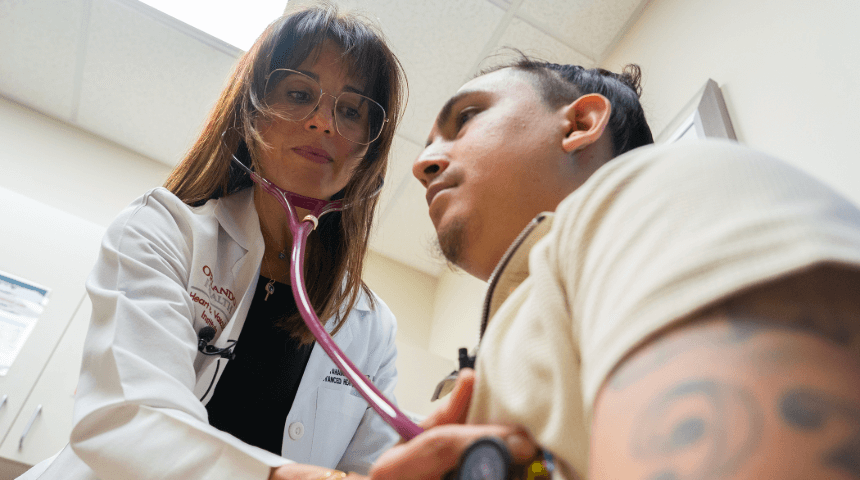Not all chest pains are created equal. And they don’t always mean you’re having a heart attack.
You should never ignore symptoms that could be a heart attack. These life-threatening events happen every 40 seconds somewhere in the U.S. Fortunately, we’ve gotten a lot better during the past couple of decades at quickly diagnosing and treating them. So your chances of surviving your first heart attack are higher.
With that in mind, it’s important to understand what a heart attack is and how to know when to seek help.
What Is a Heart Attack?
A heart attack happens when there is a severe blockage of blood to your heart. This is usually the result of a buildup of plaque (fat, cholesterol and other substances) in your coronary arteries. This condition, called atherosclerosis, occurs gradually over time, often without any noticeable symptoms. Sometimes these plaques will rupture, forming a clot that partially or totally shuts off blood to the heart that is supplied by that coronary artery. The resulting heart attack causes some heart muscle tissue to die. Symptoms (which can vary between women and men) include:
- The classic symptom is chest pain, which comes in various forms, including tightness, pressure, squeezing and aching
- Pain may spread to other parts of your upper body, including your shoulder, arm, back, neck, jaw, teeth and belly
- Cold sweat
- Unexplained fatigue
- Heartburn
- Dizziness
- Nausea
- Shortness of breath
Assessing Symptoms
One of the biggest challenges in assessing these symptoms is the fact that chest pain is associated with a wide range of conditions – some less serious than others. With a heart attack, this pain is often located under your breastbone. But as mentioned previously, it can be in other areas as well.
Before looking at other potential causes of chest pain, remember that there’s no way for you – sitting at home with Google – to definitively rule out a heart attack. If you are in pain and aren’t sure what’s happening, seek help at an urgent care or the emergency room. Let your doctors figure out what’s going on. It is our job, and we are happy to do it.
Still, there are a few telltale signs that your pain isn’t related to a heart attack. Among them:
- Your pain gets better or worse when you change positions.
- The pain gets worse when you press on the sensitive area.
- You can pinpoint a small area that’s in pain.
- The pain lasts for a just a few seconds before fading.
What Else Could It Be?
Chest pain can be a symptom of several other disorders or conditions, including the far less serious heartburn. That discomfort is caused by digestive acid getting into your esophagus – the tube that carries food from your mouth to your stomach. It is the most common non-cardiac cause of chest pain.
Based on symptoms alone, it can be difficult to tell the difference between a heart attack and heartburn. However, heart attack discomfort does tend to follow some kind of exertion, while heartburn is more likely to follow a meal.
Among the other potential causes of chest pain:
Pulled muscle: A strained chest muscle can cause sharp pain or tightness in your chest.
Pericarditis: This is an inflammation of the tissue surrounding your heart, which causes pain in the left side of your chest, neck, back and shoulders.
Pleuritic chest pain: This inflammation of the lining of your lungs can cause burning, sharp and stabbing pains in your chest when breathing deeply.
Pulmonary embolism: This occurs when something blocks one of the arteries supplying blood to your lungs. It can be life-threatening if not treated quickly.
Aortic dissection: This dangerous condition occurs when there is a tear in the inner layer of the aorta, the body’s main artery. Aortic dissection is rare but can be fatal if not treated.
Costochondritis: The inflammation of the tissue that connects your ribs to your breastbone can create a feeling of pressure in your chest.
Shingles: The virus that causes chickenpox can lie dormant for decades, before reactivating in people over the age of 50. During the early stages – before the appearance of a rash – there can be pain in the chest.
Pancreatitis: This inflammation of the pancreas can cause intense pain in the abdomen that radiates to the chest.
Anxiety: In intense cases, anxiety can create a panic attack that mimics many of the symptoms of a heart attack.
Choose to Stay in Touch
Sign up to receive the latest health news and trends, wellness & prevention tips, and much more from Orlando Health.
Sign Up





